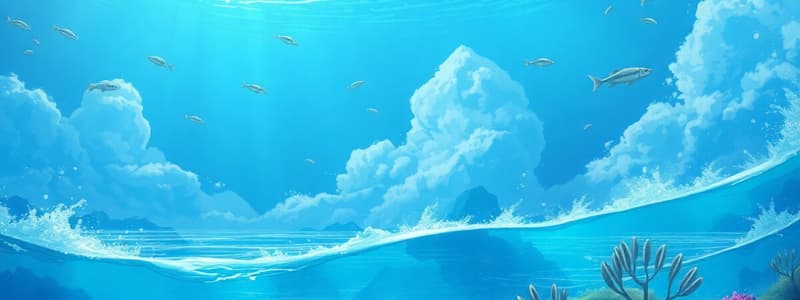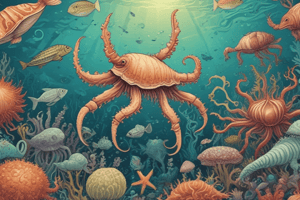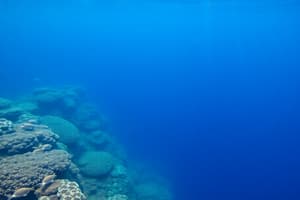Podcast
Questions and Answers
What does the term "marine" refer to?
What does the term "marine" refer to?
- Of the land
- Of the forest
- Of the sky
- Of the ocean or sea (correct)
Which of the following is a characteristic of the neritic zone?
Which of the following is a characteristic of the neritic zone?
- Area of the open ocean after the continental shelf
- Shallow waters with high levels of sunlight and nutrients (correct)
- Deep waters with little sunlight
- Daily fluctuations in water level due to tides
What distinguishes marine water from freshwater?
What distinguishes marine water from freshwater?
- Absence of dissolved salts
- Same concentration of dissolved salts
- Lower concentration of dissolved salts
- Higher concentration of dissolved salts (correct)
What is the name for plankton that can perform photosynthesis?
What is the name for plankton that can perform photosynthesis?
Which marine organisms lack a backbone?
Which marine organisms lack a backbone?
What is the function of gills in fish?
What is the function of gills in fish?
Which of these is a marine mammal?
Which of these is a marine mammal?
What adaptation do many marine mammals have to help them stay warm in the ocean?
What adaptation do many marine mammals have to help them stay warm in the ocean?
What is the photic zone in a marine environment?
What is the photic zone in a marine environment?
Which of the following are cartilaginous fishes?
Which of the following are cartilaginous fishes?
Flashcards
Marine Environments
Marine Environments
Environments found at or near oceans and seas, encompassing all life forms within them.
Intertidal Zones
Intertidal Zones
Areas like beaches and rocky shores with daily water level changes due to tides.
Neritic Zone
Neritic Zone
The zone separating the intertidal zone from the open ocean, characterized by shallow waters, high sunlight, and nutrient levels.
Oceanic Zone
Oceanic Zone
Signup and view all the flashcards
Photic Zone
Photic Zone
Signup and view all the flashcards
Aphotic Zone
Aphotic Zone
Signup and view all the flashcards
Benthic Zone
Benthic Zone
Signup and view all the flashcards
Plankton
Plankton
Signup and view all the flashcards
Marine Invertebrates
Marine Invertebrates
Signup and view all the flashcards
Marine Fish
Marine Fish
Signup and view all the flashcards
Study Notes
- Aquatic environments house diverse organisms adapted to their specific characteristics.
- Marine environments are found at or near oceans and seas.
- Marine life includes all life forms in oceans and seas.
Marine Ecosystem Types
- Intertidal zones like beaches and shores experience daily water level changes due to tides.
- The neritic zone, between the intertidal zone and open ocean, features shallow, sunlit, nutrient-rich waters.
- The oceanic zone is the open ocean beyond the continental shelf, with varying depths.
Marine environment layers
- The photic zone is the top layer receiving sunlight, up to roughly 200 meters.
- The aphotic zone lies below, where sunlight cannot penetrate.
- The benthic zone is the ocean floor, shallow near the shore and deep in open waters.
- Each zone has distinct characteristics impacting the organisms that live there.
Marine Water
- Marine waters are saltwater, with higher salt concentrations than freshwater.
- Over 97% of Earth's water is marine water.
- Marine organisms regulate internal ion balance due to high salt concentrations, producing concentrated urine to remove excess salt.
- Freshwater organisms produce dilute urine to conserve ions.
Marine Organisms
- Marine organisms include plankton, plants, algae, invertebrates, fish, mammals, and birds.
Plankton
- Plankton are organisms transported by water movement.
- Phytoplankton are photosynthetic plankton, serving as primary producers in areas where plants can't grow.
- Zooplankton are animal plankton.
Plants and Algae
- Marine plants and algae are common in neritic and intertidal habitats.
- Most marine environments are too deep for plant life due to lack of sunlight.
- Coastal plants are adapted to high ion concentrations.
- Kelp forests, formed by brown algae like kelp, provide complex habitats.
- Green and red algae are other types of marine algae.
Invertebrates
- Invertebrates are organisms without backbones.
- Marine invertebrates include crustaceans (crabs, shrimp, lobsters), mollusks (clams, snails, squid, octopi), cnidarians (sea squirts, jellyfish), corals, anemones, urchins, and starfish.
Fish
- Fish use gills to extract oxygen from the water.
- Some fish pump water over their gills, while others swim constantly.
- Fins are used for propulsion, and swim bladders help maintain buoyancy.
- Sharks and rays are cartilaginous fish that can detect electric impulses.
- Coral reefs support the most diverse fish populations due to abundant resources and habitat.
Mammals
- Marine mammals include dolphins, whales, otters, seals, and walruses.
- Many have excess fat for warmth and skin impervious to saltwater.
Birds
- Coastal areas are bird hotspots.
- Shorebirds with long bills and legs frequent beaches.
- Some birds such as albatrosses spend months flying over open waters without landing.
Studying That Suits You
Use AI to generate personalized quizzes and flashcards to suit your learning preferences.




